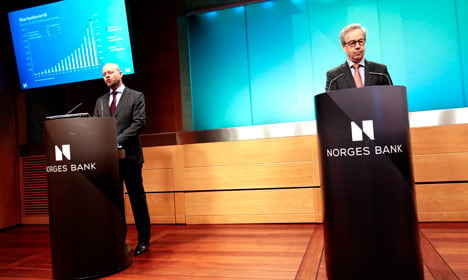OIL FUND
Worst return for Norway’s wealth fund in years
The world's biggest sovereign wealth fund, Norway's public pension fund, said Wednesday it posted a 2.7 percent return in 2015 owing to real estate and the global stock market recovery.
Published: 9 March 2016 14:01 CET

Yngve Slyngstad and Øystein Olsen presented the fund's 2015 results in Oslo on Wednesday. Photo: Lise Åserud / NTB scanpix
It was however the fund's weakest performance since 2011.
Investments posted returns of 334 billion kroner (€35.6 billion, $39 billion at current exchange rates) last year, boosting the fund's value to 7,475 billion kroner (€796 billion, $874 billion) as of the end of December.
“2015 was a volatile year, with negative interest rates, currency turmoil, falling oil prices and weaker growth expectations for emerging markets,” the head of the fund, Yngve Slyngstad, said in a statement.
“We have seen fluctuations in the fund's return from quarter to quarter, but overall a satisfying result,” he said.
Shares, which account for 61.2 percent of the investment portfolio, yielded a return of 3.8 percent, while real estate, which accounts for 3.1 percent of the portfolio, posted a return of 10 percent. Bonds, representing 35.7 percent, registered a return of 0.3 percent.
At the end of the year, the Norwegian fund, which holds stock in more than 9,000 companies worldwide, owned 1.3 percent of the world's market capitalisation. In Europe, its share was 2.3 percent.
The fund's value varies based on its investment performance and on the amount of oil revenue the Norwegian state deposits, as well as currency fluctuations.
“2016 may mark a shift in the history of the fund,” Øystein Olsen, the governor of Norway's central bank which manages the fund, told reporters.
Because of the drop in oil prices, and the subsequent decline in state oil revenue, the government is, for the first time, expected to withdraw more money from the fund this year than it deposits.
The state is allowed to dip into the fund by up to four percent to balance its budget.
This would be the first time in the fund's 20-year history that the state would not be saving money.
In January, the state withdrew a net 6.7 billion kroner.
Url copied to clipboard!


 Please whitelist us to continue reading.
Please whitelist us to continue reading.
Member comments